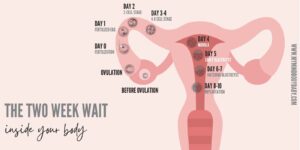For many individuals and couples, the journey to conception can be deeply emotional. When months or years of trying lead to frustration, the emotional toll can become immense—triggering anxiety, depression, and stress. What many don’t realize is that stress and infertility are intimately connected through the body’s hormonal and nervous systems.
In Traditional Chinese Medicine (TCM) and modern physiology alike, stress isn’t simply a mental or emotional experience—it’s a full-body state that impacts hormone regulation, digestion, immunity, and reproduction. To understand how stress affects fertility, we need to look at what happens inside the body when we’re under constant pressure.
What Is Stress?
From a physiological perspective, stress is the body’s response to a real or perceived threat. It’s designed as a survival mechanism—helping us react quickly to danger by activating the brain’s primal “fight or flight” response. Once the threat passes, the body ideally returns to homeostasis, or balance.
This process begins in the brain, where the hypothalamus signals the pituitary gland to activate the adrenal glands, releasing cortisol and adrenaline. Together, these hormones heighten alertness, increase heart rate, and redirect energy toward survival functions. After the stressor subsides, the body should recover and return to normal physiological function.
However, in today’s world, many people experience chronic, unresolved stress, meaning the body rarely gets the chance to rest and reset. Over time, this continuous stress load—called allostatic load—can suppress key systems, including the reproductive system.
Stress and Infertility: The Science
The HPA Axis and Hormonal Suppression
The hypothalamic-pituitary-adrenal (HPA) axis governs the stress response. When stress becomes chronic, this system interferes with the hypothalamic-pituitary-ovarian (HPO) axis, which controls reproductive hormones.
Here’s how:
- Elevated corticotropin-releasing hormone (CRH) from the hypothalamus suppresses gonadotropin-releasing hormone (GnRH).
- When GnRH is reduced, so are luteinizing hormone (LH) and follicle-stimulating hormone (FSH)—the key hormones that regulate ovulation.
- The body, in essence, “decides” that fertility isn’t a priority when under threat.
Over time, this suppression can cause irregular cycles, anovulation (lack of ovulation), poor egg quality, and even implantation challenges.
Allostatic Load and Reproductive Function
When recovery from stress is incomplete, allostatic load accumulates. This impacts multiple systems:
- Digestive System: Reduced nutrient absorption and gut motility.
- Immune System: Increased inflammation and susceptibility to illness.
- Reproductive System: Inhibited ovulation, altered hormone ratios, and reduced uterine receptivity.
In short, chronic stress tells your body it’s unsafe to conceive, shifting resources toward survival instead of reproduction.
The Emotional Side of Stress and Infertility
Beyond biology, infertility carries a heavy emotional burden. Many individuals experience feelings of shame, fear, guilt, and loss of confidence in their bodies. The societal stigma surrounding fertility challenges can lead to social withdrawal and even an identity crisis.
In TCM terms, this emotional imbalance can affect the Heart (joy and connection), the Lungs (grief and release), and the Kidneys (fear and willpower)—creating disharmony that reflects in the body and spirit.
At our clinic, we recognize that true fertility care must address both physical and emotional wellbeing. Creating a safe, compassionate environment free from stigma allows the nervous system to shift out of the “fight or flight” mode and into “rest and digest,” where healing and conception become possible.
How Acupuncture Helps Reduce Stress and Support Fertility
Acupuncture is a gentle yet powerful tool for restoring balance to the body’s nervous and hormonal systems. Here’s how it can support you on your fertility journey:
1. Regulating the Nervous System
Acupuncture activates the parasympathetic nervous system—the body’s “rest and digest” mode. This helps lower cortisol, reduce heart rate, and calm the mind. Over time, regular acupuncture sessions retrain the nervous system to recover more efficiently from stress, reducing the allostatic load that inhibits fertility.
2. Balancing Hormones
By influencing the HPA and HPO axes, acupuncture can help normalize reproductive hormone levels, supporting regular ovulation and improving uterine blood flow. This creates an optimal environment for conception.
3. Improving Circulation and Egg Quality
Enhanced blood flow to the ovaries and uterus nourishes developing follicles and supports a healthy endometrial lining—key factors in conception and implantation success.
4. Promoting Emotional Wellbeing
Acupuncture sessions encourage deep relaxation, allowing patients to release emotional tension and reconnect with their bodies. When the mind feels safe, the body follows.
Complementary TCM Therapies for Stress and Infertility
In addition to acupuncture, Traditional Chinese Medicine offers a holistic toolkit to restore harmony across body, mind, and spirit:
Nutrition and Lifestyle Support
Balancing insulin and cortisol through regular, nourishing meals helps stabilize reproductive hormones. We often recommend a three-month preconception phase to “fill the tank”—replenishing nutrients, regulating cycles, and preparing the body for pregnancy.
Mind-Body Practices
Simple techniques like box breathing, meditation, or qigong can help patients manage stress between sessions. The Microcosmic Orbit meditation, a Daoist qigong practice, balances Yin and Yang, regulates Qi, and supports reproductive and emotional health.
Ear Seeds and Acupressure
These gentle methods stimulate key points related to stress, sleep, and hormone balance—helping patients carry the benefits of acupuncture home with them.
Compassionate Communication and Emotional Safety
At our clinic, we practice compassionate honesty—offering truth with empathy. Creating an emotionally safe space allows patients to shift into parasympathetic dominance, the body’s most fertile and restorative state.
A TCM Perspective: Restoring Yin and Reconnecting Heart and Kidneys
In TCM, fertility depends on the harmony between the Heart (emotions) and Kidneys (essence and reproductive energy). Chronic stress depletes Yin, disrupts this connection, and creates internal heat and restlessness that can manifest as anxiety, insomnia, and hormonal irregularities.
Through acupuncture, herbs, and mindful lifestyle adjustments, we aim to reconnect the Heart-Kidney axis, restore Yin, and cultivate the inner calm that allows conception to occur naturally.
Finding Calm and Fertility
The connection between stress and infertility is profound—but it’s not irreversible. By addressing both the physiological and emotional impacts of stress, acupuncture and Traditional Chinese Medicine can help restore balance, regulate hormones, and create the inner environment necessary for conception.
If you’ve been struggling with fertility and feel the weight of stress, know that your body is not broken—it simply needs space to recover. With gentle, consistent care, your system can find its way back to balance, vitality, and hope.
Ready to Begin Your Healing Journey?
At Best Health Acupuncture & Wellness Clinic, we practice fertility-focused acupuncture and TCM, helping patients calm their nervous systems, regulate hormones, and support reproductive health naturally.
Contact us today to schedule your consultation and begin your path toward balance and conception.
Tel: 905.592.3004
Email: amanda@besthealthacupuncture.com
Book online HERE




